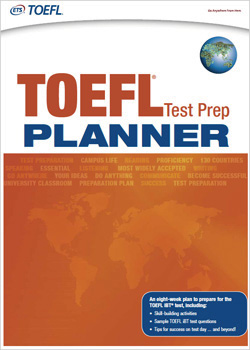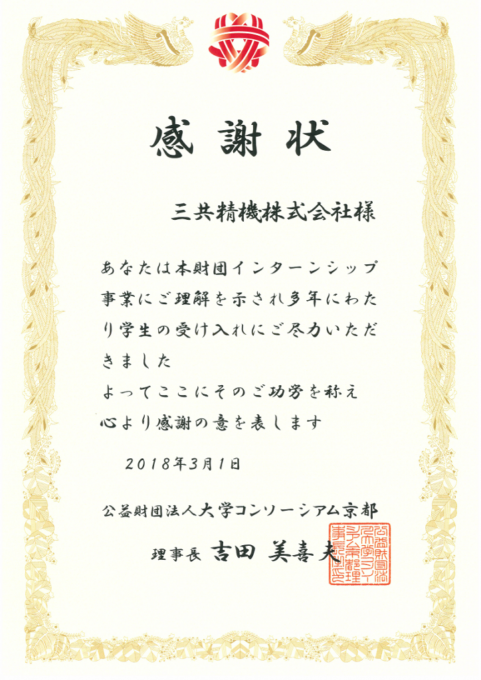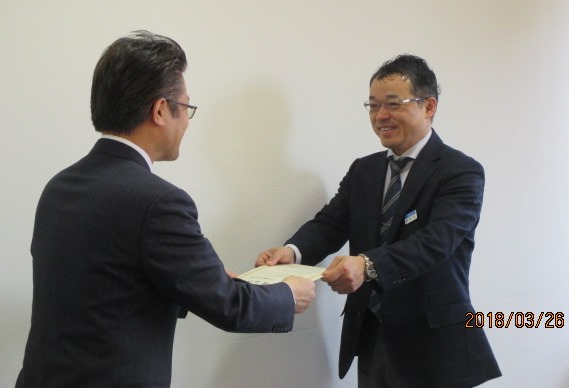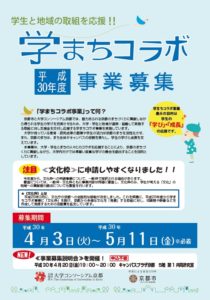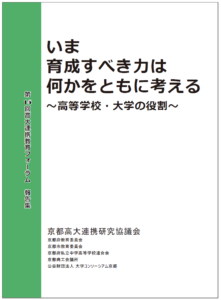We will introduce the efforts of the 29th academic collaboration project.
In order to create attractive communities and solve local issues, the “Gakumachi Collaboration Project” invites universities and students to work on projects in collaboration with the local community, and provides subsidies and support for outstanding initiatives. We will inform you of the progress of this year’s initiatives.
【Activities】Kyoto Seika University Keihoku Utsu Treasure Search Club
We would like to introduce an activity report from Mr./Ms. Taniwaki, a member of the “Keihoku Utsu Treasure Search Association”, which is active to rediscover and revitalize the charm of the region through searching for local treasures (nature, people, technology, tradition, history, etc.) in the Uzu area of Keihoku-cho, Ukyo-ku, Kyoto City.
Signboard installation work with the Ippukuya Uzu Migration Promotion Team [March 12] Report (Click here for the → report)
(Presenter: Mr./Ms. Mitamura, 2nd year student of the Faculty of Design, Kyoto Seika University)
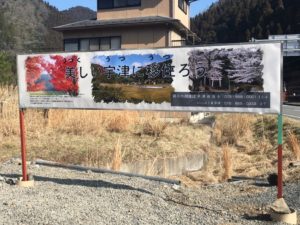
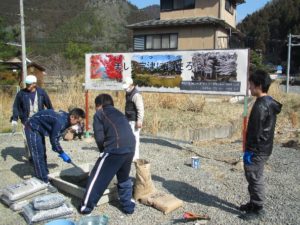
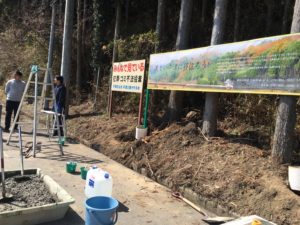

2018.03.16
【Activities】Meeting to think about the future of arithmetic and mathematics education
We would like to introduce an activity report from Mr. Mr./Ms. Katsuragi, a member of the “Association for Thinking about the Future of Arithmetic and Mathematics Education,” an organization that aims to introduce the appeal of origami culture and ORIGAMI science to children and to disseminate the charm of Kyoto to the world.
“Meeting to think about the future of arithmetic and mathematics education (origami teaching materials, open lectures)”
(Presenter: Mr./Ms. Katsuragi, 2nd year student, Graduate School of Education, Kyoto University of Education, et al.)
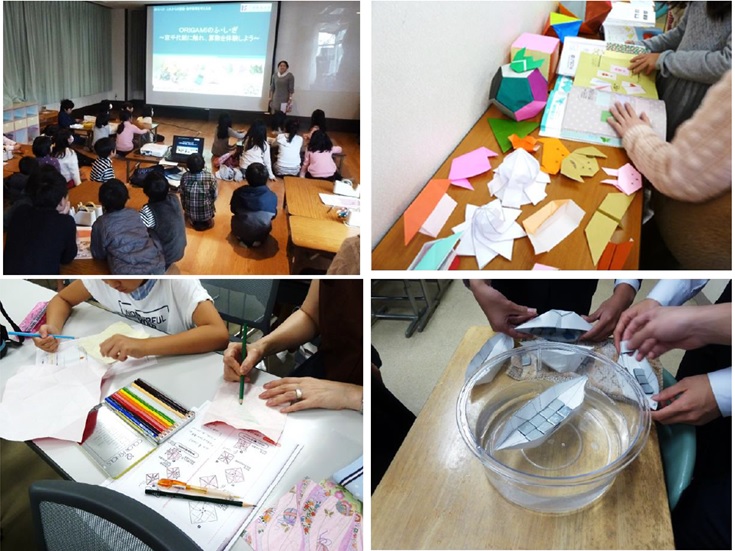
2018.02.28
【Activities】Meeting to think about the future of arithmetic and mathematics education
We would like to introduce an activity report from Mr. Mr./Ms. Katsuragi, a member of the “Association for Thinking about the Future of Arithmetic and Mathematics Education,” an organization that aims to introduce the appeal of origami culture and ORIGAMI science to children and to disseminate the charm of Kyoto to the world.
“The 5th ORIGAMI Science Class “ORIGAMI no Fu-shi-gi ~Let’s touch the Kyochiyo paper and experience arithmetic~” [January 27] Report (Click here for the → report)
“Origami Culture Booklet (Korean Version)”
(Presenter: Mr./Ms. Katsuragi, 2nd year student, Graduate School of Education, Kyoto University of Education, et al.)
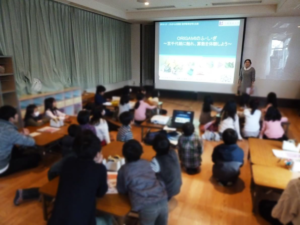
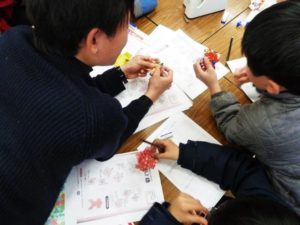
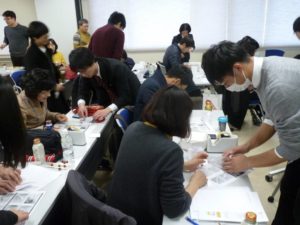
2018.02.01
【Activities】 About the implementation of “The 6th Kitashirakawa Children’s Cafeteria “Karafuru”
Based at the Kitashirakawa Children’s Center in Sakyo-ku, Kyoto City, we have received an activity report from “Karafuru”, which holds a children’s cafeteria once a month and is working to “create a place where everyone belongs” where children can have casual conversations at the “dining table”.
For more information on the day, please see the report on the Karafuru organization website (link below).
January 20 (Sat) The 6th Kitashirakawa Children’s Cafeteria “Karafuru”
Click here for the “Event Report” on the website of the → “Karafuru” organization.
Click here for the → activity report
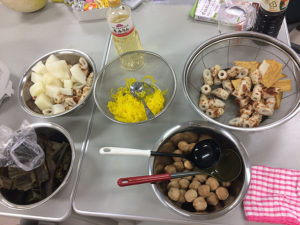
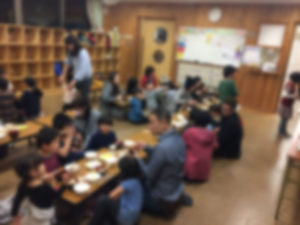
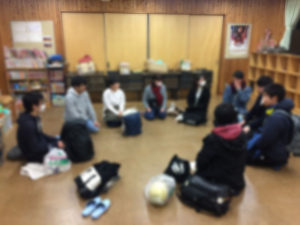
2018.02.01
【Activities】Kyoto Seika University Keihoku Utsu Treasure Search Club
We would like to introduce an activity report from a member of the “Keihoku Uzu Treasure Hunting Association”, which is active in the Uzu area of Keihoku-cho, Ukyo-ku, Kyoto City, with the aim of rediscovering and revitalizing the charm of the region through the search for local treasures (nature, people, technology, tradition, history, etc.).
Children’s Photography Class [November 25 & 26] Report (Click here for → report)
(Presenter: Mr./Ms. Tomoki Ichikawa, 1st year student, Faculty of Humanities, Kyoto Seika University)
Smile Children’s Bazaar (collaboration project with Parent and Child Smile Factory) [November 26] Report (Click here for → report)
(Presenter: Mr./Ms. Mitamura, 2nd year student of the Faculty of Design, Kyoto Seika University)
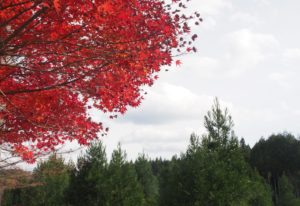

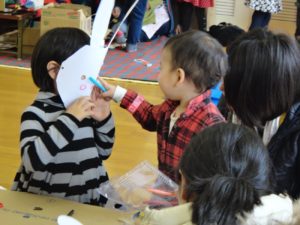
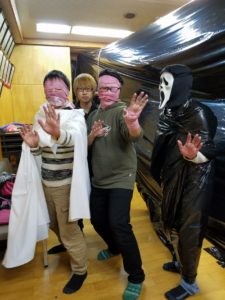
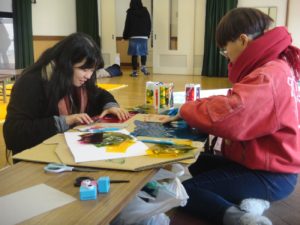
2018.01.16
【Activities】 About the implementation of “The 5th Kitashirakawa Children’s Cafeteria “Karafuru”
Based at the Kitashirakawa Children’s Center in Sakyo-ku, Kyoto City, we have received an activity report from “Karafuru”, which holds a children’s cafeteria once a month and is working to “create a place where everyone belongs” where children can have casual conversations at the “dining table”.
For more information on the day, please see the report on the Karafuru organization website (link below).
December 2 (Sat) The 5th Kitashirakawa Children’s Cafeteria “Karafuru”
Click here for the “Event Report” on the website of the → “Karafuru” organization.
Click here for the → activity report
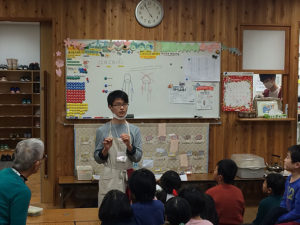
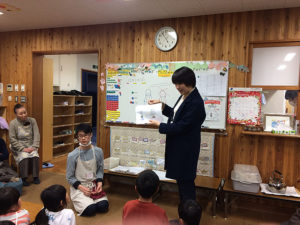
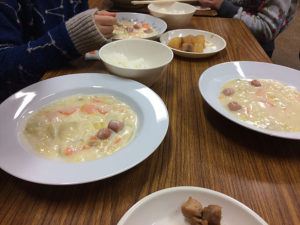
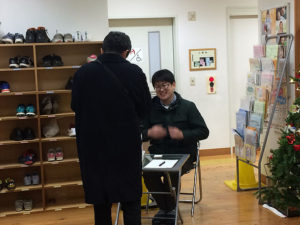
2017.12.07
【Activities】Meeting to think about the future of arithmetic and mathematics education
We would like to introduce an activity report from Mr. Mr./Ms. Katsuragi, a member of the “Association for Thinking about the Future of Arithmetic and Mathematics Education,” an organization that aims to introduce the appeal of origami culture and ORIGAMI science to children and to disseminate the charm of Kyoto to the world.
“The 4th ORIGAMI Science Classroom ~Origami and Mathematics Collaboration~” [November 18] Report (Click here for the → report)
“Origami Culture Booklet” “Interim Report”
(Presenter: Mr./Ms. Katsuragi, 2nd year student, Graduate School of Education, Kyoto University of Education)
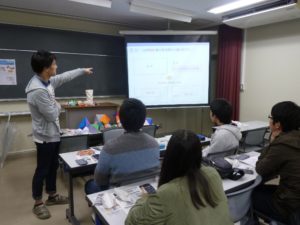
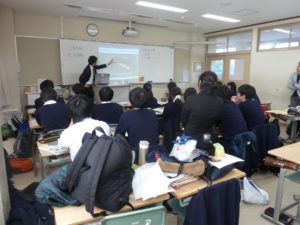
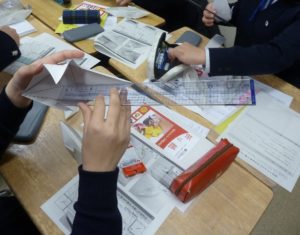
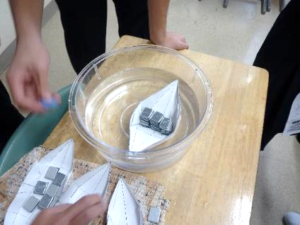
2017.11.29
【Activities】Kyoto Seika University Keihoku Utsu Treasure Search Club
We would like to introduce an activity report from Mr./Ms. Taniwaki, a member of the “Keihoku Utsu Treasure Search Association”, which is active to rediscover and revitalize the charm of the region through searching for local treasures (nature, people, technology, tradition, history, etc.) in the Uzu area of Keihoku-cho, Ukyo-ku, Kyoto City.
Vacant House Countermeasure Project & Parent-Child Smile Bazaar Preparation [November 18 & 19] Report (Click here for → report)
(Presenter: Mr./Ms. Nanami Taniwaki, 2nd year student of the Faculty of Design, Kyoto Seika University)
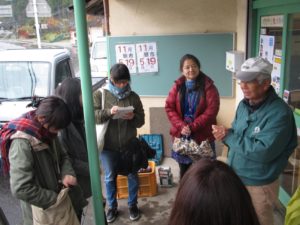
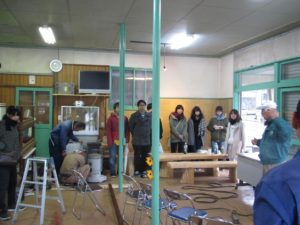
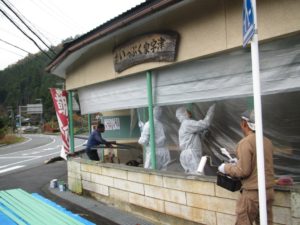
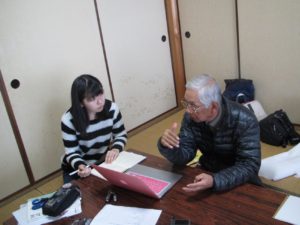
2017.11.24
【Activities】 Waku Waku Laboratory Children’s Science Classroom
On Saturday, October 28th, we visited the “Children’s Science Classroom” by the “Waku Waku Laboratory” in Kamigyo-ku, Kyoto City.
“Waku Waku Laboratory” is a student volunteer organization of the Department of Education, Bukkyo University.
Once a month, they hold science experiment classes for elementary school students in the vicinity of Kitano Shopping Street with the aim of revitalizing the community, supporting children’s learning, and creating a place for them to belong.
The theme of this year’s event is “Water to Touch: Let’s Make Artificial Salmon Salmon Roe!” Are.
The participating children wore white coats and goggles like scientists, and enjoyed the experiments with excitement.
The “Children’s Science Class” will continue to be held every month in the Kitano shopping street.
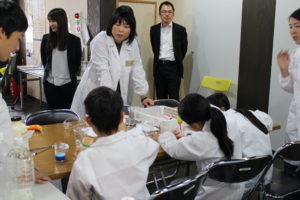
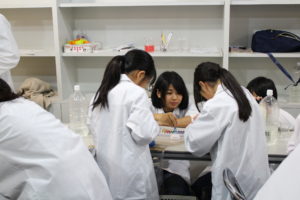
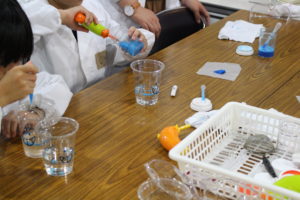

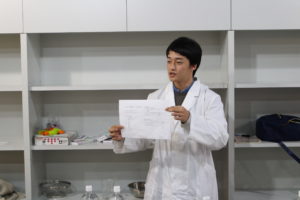
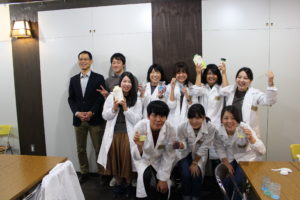
2017.11.14
【Activities】 Soratane Project “The 15th Soratane Festival”
On Saturday, October 21st, we visited the “15th Soratane Festival” by the “Soratane Project” active in Kita-ku, Kyoto City.
The “Soratane Project” is an activity by university students in Kyoto based in Shin-Omiya Shopping Street, Kita-ku, Kyoto City, with the aim of attracting the younger generation to the shopping street area, interacting with a wide range of generations, from young people to the elderly, and forming a community.
This year marks the 15th edition of the Soratane Festival. The theme was “Seeds of Smile New Omiya” and was held at the Shin-Omiya shopping street. Unfortunately, it rained on the day of the event, and the number of visitors was lower than usual, but the content was upgraded from last year with delicious food, wonderful music, and fun workshops prepared through various projects such as workshops and stalls.
The “Soratane Project” will continue to plan various events to create a space where everyone can smile and to form a community and exchange that transcends generations.
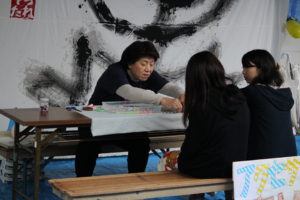
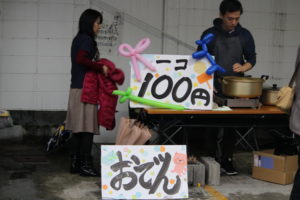
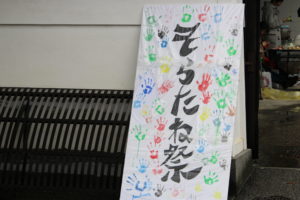
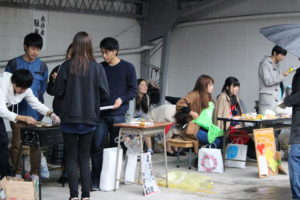
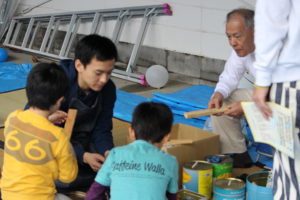
2017.11.10
【Activities】 About the implementation of “The 4th Kitashirakawa Children’s Cafeteria “Karafuru”
On Saturday, October 14th, we visited the “Kitashirakawa Children’s Cafeteria” by “Karafuru” in Sakyo Ward, Kyoto City.
“Karafuru” is led by students from Kyoto University and Doshisha Women’s University, and we want to create a “place for everyone” where people of different ages and positions can casually converse with each other through a place called a “dining table” surrounded by children. With such a thought, he is active mainly at the Kitashirakawa Children’s Center.
This time, as a collaboration project with the student group “Kiki Shokudo” to introduce Tohoku ingredients in Kyoto, a talk show about the Great East Japan Earthquake and a dismantling show of autumn salmon were held. On the day of the event, the guitar was played and the children seemed to enjoy participating from beginning to end in a cheerful and easy-to-talk atmosphere.
For details on the day, please refer to the “Activity Report” below and the event report on the “Karafuru” organization website.
October 14 (Sat) The 4th Kitashirakawa Children’s Cafeteria “Karafuru”
Click here for the “Event Report” on the website of the → “Karafuru” organization.
Click here for → activity report
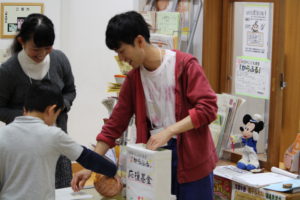
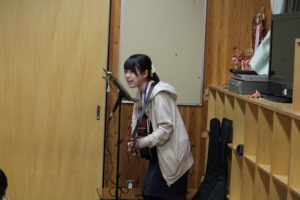
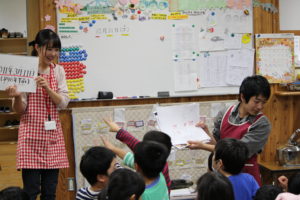
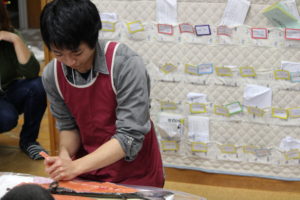
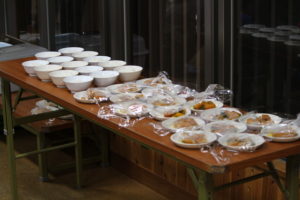
2017.11.08
【Activities】Meeting to think about the future of arithmetic and mathematics education
☆ “The 4th ORIGAMI Science Class ~Origami and Mathematics Collaboration!~”
We would like to introduce the new information of the “Association for Thinking about the Future of Arithmetic and Mathematics Education” adopted this year.
The “Association for Thinking about the Future of Arithmetic and Mathematics Education” is an activity by students of Kyoto University of Education to introduce the appeal of origami culture and origami science to children, and to disseminate the charm of Kyoto to the world.
On Saturday, November 18th, “The 4th ORIGAMI Science Classroom ~Origami and Mathematics Collaboration!~” will be held. If you are interested, please join us.
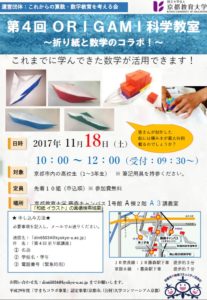
“The 4th ORIGAMI Science Classroom ~Origami and Mathematics Collaboration!~”
Date & Time: Saturday, November 18, 2017 10:00~12:00 (Reception: 9:30~)
Eligibility: High school students in Kyoto City (1st ~ 3rd grade) *Please bring your own writing utensils.
Capacity: First 10 groups (in order of application) *Free of charge
Venue: Kyoto University of Education, Fujimori Campus, Building 1, Building A, 2nd floor, A3 Lecture Room
* For details, please see ⇒ flyer here.
【Activities】 Shikasu “Caricature Workshop”
On Saturday, October 14th, I visited the “Caricature Workshop” by “Shikasu” in Sakyo Ward, Kyoto City.
“Shikasu” is a volunteer group of Kyoto Seika University students who are working to expand opportunities for local children and the elderly to come into contact with art, mainly by holding art workshops at children’s centers and day service centers in Sakyo-ku, Kyoto City.
This time, we will exhibit a booth at the “55th Iwakura Autumn Festival” hosted by Iwakura Hospital, and the students of “Shikasu” will create caricatures for those who wish.
On the day of the event, it was very popular with everyone from children to the elderly, and from the very beginning, people who wanted to make reservations came one after another.
Participants can choose their favorite from Deformed Touch, Real Touch, and Anime/Manga Touch.
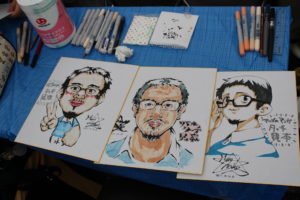

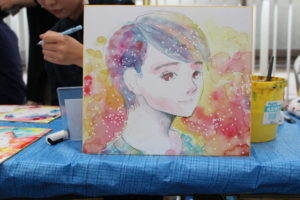
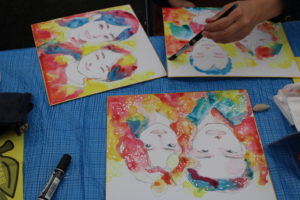
It takes about 40 minutes for each caricature to be created carefully and thoughtfully one by one, but we were careful to create a fun atmosphere while communicating with the participants so as to bring out smiles on their faces.
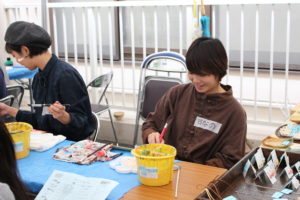
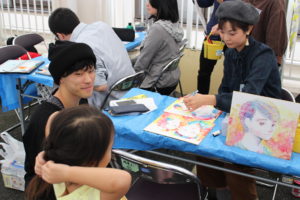
It was very impressive to see the participants happily receiving the completed caricature with a smile.
In the future, Shikasu will continue to hold various art workshops to make creative activities familiar to people who do not usually have the opportunity to come into contact with art.
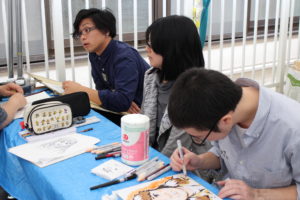
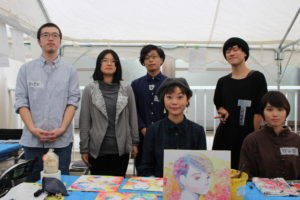
2017.10.20
【Activities】Environmental protection of Fushimi Fukakusa and Higashitakase River and Jizo Bon Project
We would like to introduce the activity report from the “Ryukoku University-Higashitakase River Environmental Protection and Jizo Bon Project Team”, which continues to work in the area around the Higashitakase River in Fushimi Ward.
“Letter of appreciation” from the local residents’ association for our activities
At the beginning of October, we held a post-mortem study session with local Mr./Ms. to review our activities so far. At that time, we received a “letter of appreciation” from the Kawakubo Town Residents’ Association.
Cleaning up the river and mowing the grass in the heat, planning and managing the Jizo Bon program conceived by the students, stamp rallies that went to the homes of children and the elderly, bamboo lanterns handmade by local residents, high school students, and students, fruit punch hollowed out of watermelons, and fireworks were all pleasant memories.
I am very happy to receive a “letter of appreciation” from everyone in the community, Mr./Ms.. Thank you very much.
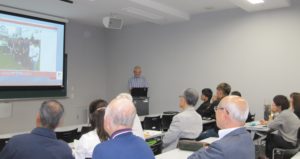
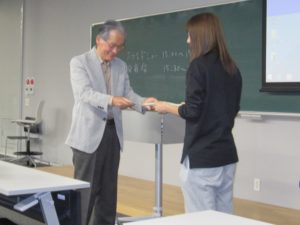
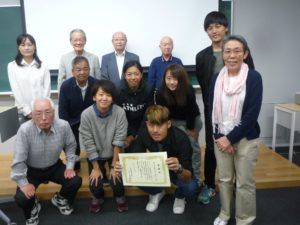
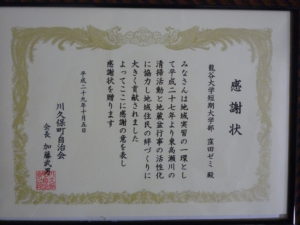
2017.10.07
【Activities】 S-Team ~Creating a place to connect high school girls and grandmothers~
We would like to introduce the initiatives of the student organization “SMILE” that were adopted this year.
The student organization SMILE aims to create a community that connects the elderly in nursing homes by making use of the fields in which high school girls are good at (makeup, nails, etc.), and furthermore, through the planning of exchange events by high school students and study sessions on community revitalization for the elderly among high school and university students, we aim to improve the self-esteem of high school students. It is an activity that aims to contribute to the prevention of loneliness for the elderly.
We have received an activity report from a group member, so please take a look.
Student Group SMILE Activity Report [Saturday, July 22] (Click here for → report)
(Presenter: Mr./Ms. Uehara, 2nd year student at Ritsumeikan University)
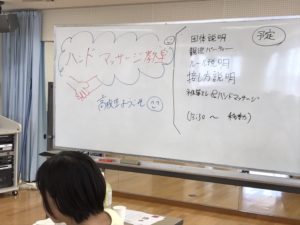
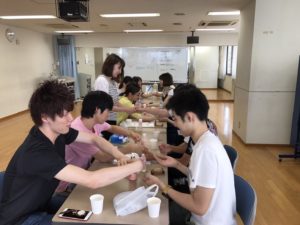
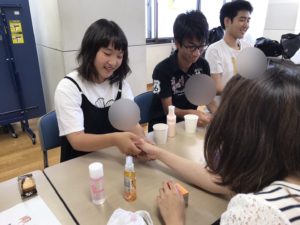
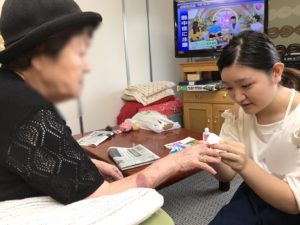
2017.8.31
【Activities】Keihoku Utsu Fureai Learning Together
We would like to introduce the “Kyoto Seika University Keihoku Utsu Treasure Search Association” that was adopted this year.
The Kyoto Seika University Keihoku Utsu Treasure Search Association gathers students in the Utsu area of Ukyo Ward, Kyoto City, where depopulation is progressing, and conducts various initiatives while interacting with local residents, with the aim of reaffirming the goodness and rarity of the region that local residents were not aware of through the knowledge and young sensibilities of the students, and disseminating the charm of Utsu, which is blessed with rich nature, history, and culture, as a “treasure” both inside and outside the region.
We have received an activity report from a group member, so please take a look.
“The 4th Children’s Festa in Uzu Day 1 [Saturday, August 5] Report (Click here for → report)”
(Presenter: Mr./Ms. Mitamura, 2nd year student of the Faculty of Design, Kyoto Seika University)
“The 4th Children’s Festa in Uzu Day 2 [Sunday, August 6] Report (Click here for the → report)”
(Presenter: Mr./Ms. Sugiura, 3rd year student of Kyoto Seika University, Faculty of Manga)
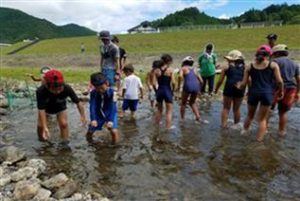
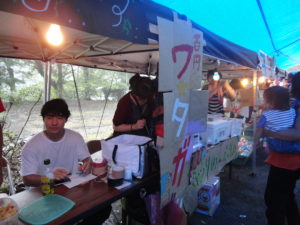
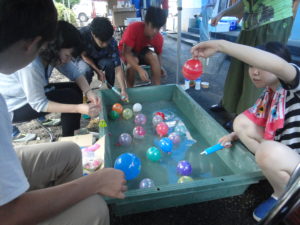
2017.8.31
【Activities】Disseminating Culture through ORIGAMI Science
We would like to introduce the initiatives of the “Association for Thinking about the Future of Arithmetic and Mathematics Education” adopted this year.
The purpose of the Association for Thinking about the Future of Arithmetic and Mathematics Education is for students from Kyoto University of Education to introduce the appeal of origami culture and origami science to children, and to disseminate the charm of Kyoto to the world.
As one of these activities, the “1st ORIGAMI Science Class ~Let’s touch the Kyochiyo paper and experience arithmetic!~” was held on Saturday, July 29th. The report has been received from the activity members, so please take a look.
『 The 1st ORIGAMI Science Class ~Let’s touch the Kyochiyo paper and experience arithmetic!~ [Saturday, July 29] Report (Click here for the → report)
(Presenter: Mr./Ms. Katsuragi, 2nd year student, Graduate School of Education, Kyoto University of Education)
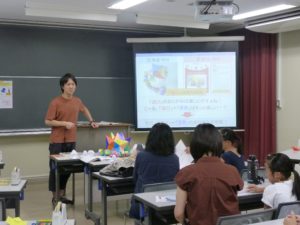
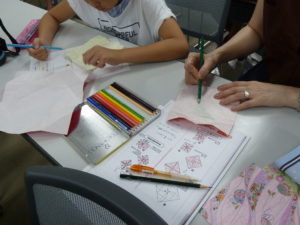
On Saturday, September 23rd, “The 3rd ORIGAMI Science Class ~Collaboration between Kyoto’s Origami Culture and Mathematics~” will be held. If you are interested, please join us.
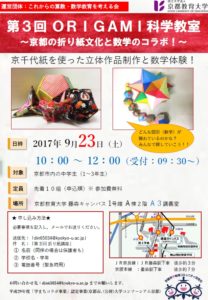
“The 3rd ORIGAMI Science Classroom ~Collaboration between Kyoto’s Origami Culture and Mathematics~”
Date & Time: Saturday, September 23, 2017 10:00~12:00 (Reception: 9:30~)
Place: Kyoto University of Education Bldg. 1, Building A, 2nd Floor, A3 Lecture Room (Fushimi-ku, Kyoto)
* For details, please see ⇒ flyer here.
*******************************************************************************
Please click here for details such as introductions and information on past initiatives.
Organization HP: http://math.kyokyo-u.ac.jp/math_kyokyo/news.html
********************************************************************************
2017.8.30
【Activities】Environmental protection of Fushimi Fukakusa and Higashitakase River and Jizo Bon Project
We would like to introduce the efforts of the “Ryukoku University-Higashitakase River Environmental Protection and Jizo Bon Project Team” adopted this year.
The Ryukoku University’s Higashi-Takase River Environmental Protection and Jizo Bon Project Team is planning and implementing a Jizo Bon in Fushimi Ward in Fushimi Ward that allows everyone from children to the elderly to actively participate in the development of environmental protection through cleanup activities on the Higashi-Takase River together with local organizations, neighborhood associations, neighborhood associations, and students of Fushimi Technical High School.
We have received an activity report on this year’s Jizo Basin, so please take a look.
“This year’s bamboo lanterns are handmade by students, high school students, and local residents [Friday, July 14]”
The last year of Kyoto Municipal Fushimi Technical High School, which has been working on environmental issues in the Higashi-Takase River for a long time, our students, and local residents gathered to make bamboo lanterns by hand for this year’s Jizo Bon Festival. We learned from local Mr./Ms., and together with high school and university students, we were able to make 40 pieces in one and a half hours.
Bamboo lanterns are made in collaboration with high school students, university students, and local residents, and the results of collaborative work are lit up on the Higashitakase River at night on the Jizo Basin. Now, the Jizo Bon in Kawakubo Town seems to have become firmly established as a “bamboo lantern” on the Higashi-Takase River.
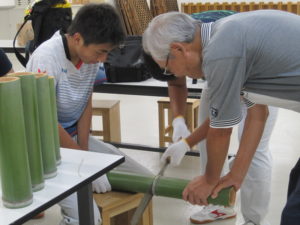
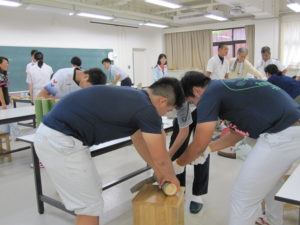
“Jizo Bon in Kawakubo Town [Saturday, August 19th] “
This year’s bamboo lanterns are handmade in collaboration with students, high school students, and local residents. When the scraps were combined to draw the words “Kawakubo Town”, everyone in the area was delighted with this surprise, Mr./Ms. the community.
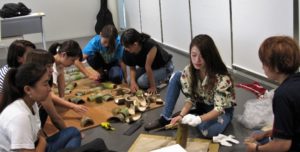
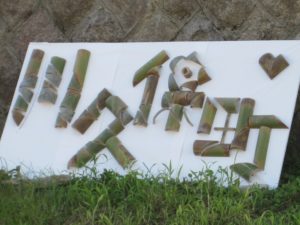
The popular fireworks in the evening, the watermelon hollowed-out floop punch, and of course, the bamboo lanterns from the Higashi-Takase River have now become the main event of the Kawakubo-cho Jizo Bon and many people enjoyed.
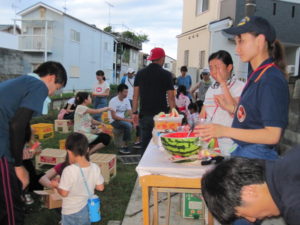
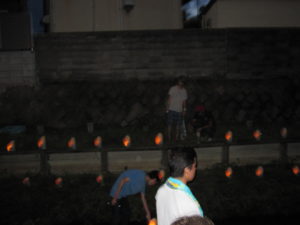
When the children’s favorite anime song plays, everyone starts singing. Mr./Ms. Tozaki, who played the story, received a big round of applause from everyone. We felt a sense of accomplishment as the venue came together through our project.
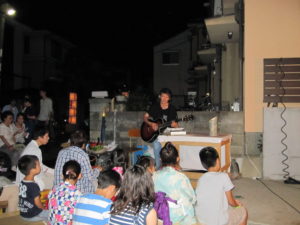
2017.8.30















